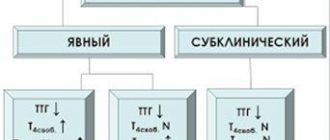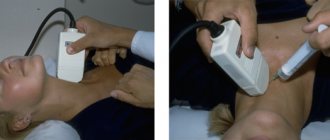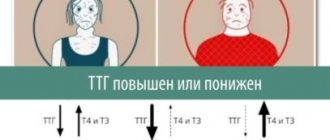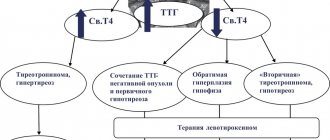Hyperthyroidism is a condition of hyperfunction of the thyroid gland, which is accompanied by excessive production of thyroxine and triiodothyronine. An increase in the level of hormones in the blood accelerates metabolic processes in the body and has a negative effect on almost all organ systems. Symptoms of hyperthyroidism reduce the patient's quality of life. Hyperthyroidism is a condition of hyperfunction of the thyroid gland, which is accompanied by excessive production of thyroxine and triiodothyronine. An increase in the level of hormones in the blood accelerates metabolic processes in the body and has a negative effect on almost all organ systems. Symptoms of hyperthyroidism reduce the patient's quality of life.
Adequate and timely treatment allows you to prevent complications and slow down pathological processes, up to the complete restoration of thyroid function.
Symptoms of thyrotoxicosis (hyperthyroidism)
Many patients have a pronounced characteristic set of symptoms of thyrotoxicosis:
- anxiety;
- emotional instability;
- weakness;
- tremor (shaking) of the limbs;
- cardiopalmus;
- increased sensitivity to heat;
- sweating;
- weight loss with normal or increased appetite.
The following manifestations are also possible: frequent urination, menstrual irregularities (oligomenorrhea or amenorrhea) in women, gynecomastia and erectile dysfunction in men.
Patients with less severe hyperthyroidism or older people often have symptoms related to one or more organs or systems.
Isolated signs, in the presence of which hyperthyroidism should be diagnosed:
- unexplained weight loss;
- arrhythmia;
- myopathy;
- menstrual irregularities;
- gynecomastia.
Other conditions that may suggest hyperthyroidism:
- osteoporosis;
- hypercalcemia;
- arrhythmias;
- breathing problems;
- worsening glycemic status in patients with diabetes.
In elderly patients, cardiopulmonary symptoms such as tachycardia, arrhythmia, dyspnea on exertion, and edema may predominate. There is also a trend toward greater weight loss with less increase in appetite. In some patients, the only symptoms are weakness and asthenia.
Complications
Like other diseases without treatment or with improper self-medication, hyperthyroidism can cause complications. The most severe of them are complications of:
- Heart – arrhythmias, heart failure. Interruptions worsen with physical activity.
- Musculoskeletal system - changes occur in the structure of the bones, they become fragile. Metabolism is disrupted, the bone is insufficiently supplied with calcium and is depleted.
- Eyes - a characteristic disease is Graves' syndrome with ophthalmopathy. This is caused by overgrowth and swelling of the tissue behind the eyeballs. Typical patient complaints are discomfort in the eyes, lacrimation, eyelids do not close completely, increased sensitivity to light, double vision, decreased acuity.
- Skin – Graves' dermopathy. This is redness and swelling of the legs and feet.
In particularly advanced cases, a thyrotoxic crisis may occur. With it, all the symptoms of the disease sharply intensify, tachycardia and heart failure, and there may be mental disorders. The patient needs emergency help.
Disturbances in the production of hormones cannot be ignored. Over time, this fact provokes a lot of additional pathologies. In addition, hyperthyroidism causes unpleasant symptoms. All this prevents a person from living a normal life. Mood swings and irritability can poison relationships within the family and with loved ones. The problem will not go away on its own.
It is impossible and simply dangerous to treat hyperthyroidism without a thorough examination and an individually selected doctor regimen. Self-prescription of drugs has a negative impact on overall health and can lead to the development of severe pathologies and even death.
It is not necessary to endure the symptoms of hyperthyroidism. At the Kutuzovsky Children's Hospital they will diagnose diseases that cause hyperthyroidism and help you get rid of the pathology. Make an appointment with specialists at the Kutuzov Diagnostic and Treatment Center. We will help you find a healthy and fulfilling life.
Examination and physical examination
When examining and auscultating a patient with hyperthyroidism, you can find:
- skin is usually moist and hot to the touch;
- tachycardia;
- possible arrhythmia (irregular pulse);
- possible systolic hypertension (increased systolic pressure);
- tremor (shaking) of the limbs;
- increased reflexes;
- weakness of the muscles of the limbs;
- exophthalmos, periorbital edema, limited mobility of the eyeball - symptoms of Graves' disease - an autoimmune disease of the thyroid gland with hyperthyroidism.
Enlarged thyroid gland. Palpation of the thyroid gland
The presence or absence of a goiter depends on the condition that caused hyperthyroidism:
- enlargement of the thyroid gland from slight to giant is observed in patients with Graves' disease or toxic multinodular goiter, while in elderly patients with Graves' disease the thyroid gland may not be palpable;
- patients with painless thyroiditis may have a non-enlarged or slightly enlarged thyroid gland;
- a single node may suggest a thyroid adenoma;
- The thyroid gland is sensitive and painful in subacute thyroiditis.
How to treat hyperthyroidism
Methods and timing of therapy depend on the type of hyperthyroidism, its causes, other diseases in the patient, and his age.
Conservative treatment is used:
- Preparations with iodine isotopes - they reduce the activity of the gland, accumulating in its tissues (compensation option). The organ returns to normal size, its functioning is normalized. Treatment is carried out under the supervision of a doctor and periodic monitoring of the patient’s health. If the process is uncontrolled, the activity of the thyroid gland may be excessively suppressed, which leads to hypothyroidism (low levels of hormones).
- Medicines to suppress the production of thyroid hormones. Relief of the patient's condition is observed within 2-3 weeks from the start of therapy, and the course as a whole lasts up to a year. Periodic examinations are also necessary in this case - antithyroid drugs can affect the liver and immune system. At the same time, she will react with allergies or decreased immunity - an increase in the incidence of acute respiratory viral infections and other colds.
- Relief of symptoms - medications are prescribed to normalize blood pressure, heart rate and eliminate other symptoms.
In severe cases of advanced hyperthyroidism, when the thyroid gland is significantly enlarged or there are tumors in it, the doctor may recommend surgery. It removes the affected part of the gland or the entire organ. After removal, you will have to take hormonal medications for life to correct their deficiency.
Blood tests for thyroid hormones
Basic tests to assess thyroid function: TSH, T4 free and total, T3 free and total. If necessary, other tests are prescribed. See "Thyroid Exam"
- decrease in TSH level; the degree of gland dysfunction is not assessed by the TSH level alone;
- with obvious hyperthyroidism, an increase in thyroid hormones is also observed - total T3 and total T4, free T3 and free T4;
- some patients show an isolated increase in T4 or T3;
- in subclinical hyperthyroidism, the TSH level is below reference values (usually above 0.05 mIU/l), and total T3 and T4, free T3 and free T4 are within normal limits.
Hyperthyroidism is a condition in which the thyroid gland produces an excess amount of hormones. Normally, they are necessary for normal growth and development of the body, and are also responsible for all types of metabolism.
Overproduction of hormones leads to an acceleration of metabolic processes in the body, which is accompanied by an increase in the functional load on the cardiovascular system. This condition can also be called thyrotoxicosis.
A particularly dangerous manifestation of hyperfunction of the thyroid gland is thyrotoxic crisis. It is characterized by a rapid increase in pre-existing symptoms and is accompanied by profuse sweating, tachycardia, and clouding of consciousness. In such situations, immediate medical attention is needed.
Treatment is carried out mainly by conservative methods: taking antihormonal drugs and radioactive iodine drugs.
Synonyms Russian
Thyrotoxicosis.
English synonyms
Overactive thyroid, Hyperthyroidism.
Symptoms
Symptoms of hyperthyroidism can be disguised as various diseases of the cardiovascular, nervous, digestive and other organ systems. Thus, identifying this syndrome is not always an easy task.
Hyperthyroidism may present with the following symptoms:
- sudden loss of body weight, although appetite may not only be maintained, but also increased;
- rapid heartbeat (tachycardia), a feeling of interruptions in the work of the heart, arrhythmias;
- nervousness, restlessness and irritability;
- tremor - small twitching of the fingers;
- increased sweating;
- menstrual irregularities;
- increased body temperature;
- intestinal dysfunction, tendency to diarrhea;
- enlargement of the thyroid gland, which manifests itself as a tumor-like formation at the base of the neck (goiter);
- fatigue, muscle weakness;
- sleep disturbance;
- eye symptoms – enlargement of the visible part of the eyeballs, blurred vision, redness, dry eyes;
- changes in the skin around the ankles in the form of thickened skin, itchy red rashes that then turn brown.
General information about the disease
The thyroid gland is located at the base of the neck and is shaped like a butterfly. The main thyroid hormones are thyroxine (T4) and triiodothyronine (T3). They control protein, fat and carbohydrate metabolism, regulate body temperature, rhythm and heart rate. In addition, the thyroid gland synthesizes another hormone - calcitonin. It controls the level of calcium in the blood.
Regulators of thyroid function are the hypothalamus and pituitary gland, glands located in the brain. Having received a signal from the hypothalamus, the pituitary gland synthesizes thyroid-stimulating hormone (TSH). TSH is captured by receptors on thyroid cells, which stimulates the synthesis of thyroid hormones.
The amount of TSH in the blood is regulated through a feedback mechanism. Thus, with its increase in the blood, the level of T3 and T4 decreases. In turn, a decrease in the level of thyroid hormones in the blood leads to stimulation of TSH production.
In the absence of thyroid pathology, the levels of all hormones are within normal limits.
Diseases leading to hyperthyroidism:
- Diffuse toxic goiter (Graves disease) is the most common cause of thyrotoxicosis. As a result of immune disorders, antibodies are formed that stimulate the production of thyroxine (T4). Normally, antibodies protect the body from germs and viruses. In Graves' disease, antibodies act not only on the thyroid gland, but also on the tissue behind the eyeballs, which causes the growth of retrobulbar tissue (ophthalmopathy), skin, most often in the ankle area, where redness and itching occurs (dermopathy).
- Increased production of hormones by thyroid nodules (nodular toxic goiter, Plummer's disease, toxic thyroid adenoma). Adenomas are benign formations that lead to enlargement of the thyroid gland. Some of them may not produce thyroxine and do not lead to hyperthyroidism.
- Thyroiditis. Inflammation of the thyroid gland, arising from various causes. There is subacute thyroiditis, which may be accompanied by pain in the neck. Other forms are painless. In some cases, inflammation may occur after childbirth (puerperal thyroiditis).
Less common causes of hyperthyroidism are:
- Exposure to radioactive iodine or taking iodine supplements by people who previously suffered from iodine deficiency.
- Ovarian tumors (teratoma), characterized by the presence of tissues atypical for this organ. In some cases, the structure of these tumors is similar to the tissues of the thyroid gland and their cells can synthesize thyroid hormones.
- Pregnancy complicated by conditions in which the level of human chorionic gonadotropin (hCG) is increased by 100 times or more. Normally, hCG is produced by the tissues of the fetus, its action is aimed at maintaining pregnancy. Its level reaches its maximum values by the 9-11th week, then hCG begins to decrease as the placenta forms. With pathological, aggressive development of embryonic tissues, this decrease does not occur. High levels of hCG stimulate TSH receptors on thyroid cells, which leads to an increase in the level of thyroid hormones in the blood.
- Pituitary tumors, thyroid cancer and its metastases.
- Iatrogenic (thyroid hormone therapy).
Who is at risk?
- Pregnant women.
- Persons with a genetic predisposition to thyroid pathology.
- Those located under conditions of radioactive influence.
- Living in conditions of iodine deficiency.
Diagnostics
If hyperthyroidism is suspected, the following tests may be ordered:
- Thyroid-stimulating hormone (TSH), the level of which in the blood will be reduced. Rarely, its amount may be within normal limits or even increased. This occurs if the cause of hyperthyroidism is a pathology of the pituitary gland.
- Total triiodothyronine (T3) and total thyroxine (T4) reflect the total amount of hormones synthesized by the thyroid gland. Their level is usually elevated. Total T4 may remain normal in asymptomatic forms of hyperthyroidism.
- Free triiodothyronine (free T3) and free thyroxine (free T4) are biologically active forms of hormones. Their number will also be increased.
- Serum calcitonin – its amount can also increase with hyperthyroidism.
- T-Uptake (thyroxine-binding ability of blood) is the ability of the blood to bind thyroxine through proteins, thereby converting it into an inactive form. When the blood is oversaturated with hormones, it decreases, and vice versa. Thus, T-Uptake will be reduced in true hyperthyroidism and increased in cases of impaired binding of thyroxine to plasma proteins.
Additionally, to diagnose Graves' disease you can use:
- Antibodies to TSH receptors (anti-pTTG) are protective proteins of the immune system, which, in pathology, are produced to receptors located on the cells of the thyroid gland, which stimulates the production of T3, T4.
- Antibodies to thyroid peroxidase (anti-TPO). TPO is an enzyme responsible for activating the iodine molecule and including it in the synthesis of thyroid hormones. An increase in the production of such antibodies speaks in favor of an autoimmune process.
- Antibodies to thyroglobulin (antiTG), a protein from which thyroid hormones are formed. An increase in their titer may indicate an autoimmune lesion.
To diagnose hyperthyroidism caused by thyroid tumors or inadequate therapy with L-thyroxine (a drug used for thyroid hormone replacement therapy), blood determination is used:
- Thyroglobulin is a protein that is a precursor of thyroid hormones. Its level increases in cancer pathology and decreases in hyperthyroidism caused by replacement therapy.
Additional research:
- Clinical blood test: an increase in the level of leukocytes and ESR may be observed, which may indirectly indicate an inflammatory process in the tissues of the thyroid gland.
- Biochemical blood test: the level of total protein, glucose, cholesterol may be reduced, the amount of calcium increased.
- Radioisotope study with iodine. The thyroid gland needs iodine to synthesize hormones. Therefore, to assess its hormonal activity, the patient is asked to drink a solution with labeled iodine atoms. Then the intensity of the entry of this iodine into the blood, and therefore the intensity of hormone synthesis, is monitored.
- Ultrasound of the thyroid gland. The structure of the gland, the nature of pathological changes, the number and size of nodes are determined.
The scope of additional examination is determined by the attending physician.
Treatment
Treatment consists of taking antihormonal drugs and radioactive iodine drugs, which suppress the overactivity of the thyroid gland. B-blockers, drugs that reduce heart rate, can also be used as symptomatic treatment. If conservative therapy is ineffective, surgical treatment is performed. In this case, almost the entire thyroid gland is removed.
Moisturizing eye drops are used to treat eye manifestations in the initial stages. In advanced stages, prednisolone injections into the postorbital tissue are used. If these methods are ineffective, surgical removal of the overgrown tissues of the orbits is performed.
Recommended tests
- Thyroid-stimulating hormone (TSH)
- Free thyroxine (free T4)
- Total thyroxine (T4)
- Total triiodothyronine (T3)
- Free triiodothyronine (free T3)
- Serum calcitonin
- Antibodies to TSH receptors (anti-pTTH)
- Antithyroglobulin antibodies (antiTG)
- Antibodies to thyroid peroxidase (anti-TPO)
- Thyroglobulin
- T-Uptake
Changes in other tests for thyrotoxicosis (hyperthyroidism)
In addition to changes in the level of hormones of the pituitary gland and thyroid gland, nonspecific changes can be detected in other organs and systems. For example, with thyrotoxicosis there is a tendency for HDL, LDL and total cholesterol to decrease, increasing after the start of treatment.
The general blood test may also change - the number of red blood cells - erythrocytes - increases, but the volume of circulating plasma increases more significantly, due to which the blood is diluted, so-called normochromic normocytic anemia occurs.
Alkaline phosphatase and osteocalcin levels may be increased, indicating increased bone metabolism.
Diagnostics
If thyrotoxicosis is suspected, the endocrinologist will prescribe the following studies:
- Blood test for thyroid hormones. Only their excess can reliably indicate a disease.
- Study of the amount of thyroid-stimulating hormones (TSH level).
- Blood test for the presence of antibodies to hormones. The appearance of antibodies indicates the autoimmune nature of hyperthyroidism.
- Ultrasound of the thyroid gland. If diffuse toxic goiter is observed, the gland increases in size and its structure changes. In the case of nodular toxic goiter, areas with altered structure and density are formed in the body of the gland.
- Thyroid scintigraphy (tomography with the introduction of radioactive markers) to study the structure of the thyroid gland and identify the causes of the disorder.
- Ophthalmological examinations if eye damage is visually or functionally manifested.
- Cardiograms and other studies of organs that may be affected by thyrotoxicosis.
If the diagnosis is confirmed by laboratory tests, treatment is prescribed.
Low TSH without hyperthyroidism
In some cases, a low TSH level does not mean hyperthyroidism:
- central hypothyroidism – low TSH levels and normal or decreased T4 and T3 levels;
- non-thyroid diseases, especially in diseases in which patients receive high doses of glucocorticoids or dopamine, may be accompanied by low TSH and reduced free T4, T3;
- recovery from treatment of hyperthyroidism: serum TSH concentrations may remain low for several months after normalization of thyroxine and triiodothyronine levels;
- physiological decrease in TSH during pregnancy;
Interpretation of thyroid tests
| TSH | T3 | T4 | Presumable diagnosis |
| Short | High | Normal |
|
| Short | Normal | High |
|
| Normal or high | High | High |
|
Tags:
TSH, thyroid gland, hyperthyroidism, thyrotoxicosis, thyroiditis, pituitary tumors, Graves' disease
Back to section
Causes
Hyperthyroidism can occur for a variety of reasons. Hyperthyroidism can be primary, secondary and tertiary.
Among the main factors that contribute to the appearance of primary hyperthyroidism:
- Congenital or acquired lesions of the thyroid gland - inflammation, iodine deficiency or excess.
- Diseases of an autoimmune nature (due to improper functioning of the immune system). With them, antibodies to thyroid cells appear in the body. Autoimmune Hashimoto's thyroiditis and Basedow's disease occur, and triiodothyronine production increases.
- Nodular goiter, adenoma - the appearance of compactions and tumors in the tissues of the gland.
- Inflammation of the thyroid gland - thyroiditis, in which its follicles are destroyed, and the hormones from them enter the blood.
Secondary hyperthyroidism is a consequence of a decrease in the level of thyroid-stimulating hormone (TSH) due to disorders in the pituitary gland. TSH stimulates the activity of the thyroid gland, so there may be an increase in the functionality of a healthy thyroid gland due to the pituitary gland.
Tertiary hyperthyroidism is caused by malfunctions in the hypothalamus and a decrease in its functioning.
Hyperthyroidism is more common in people with a genetic predisposition to endocrine diseases. Women get sick more often than men. Risk factors include living in an endemic area (with iodine deficiency), polluted environmental conditions, and frequent stress.








